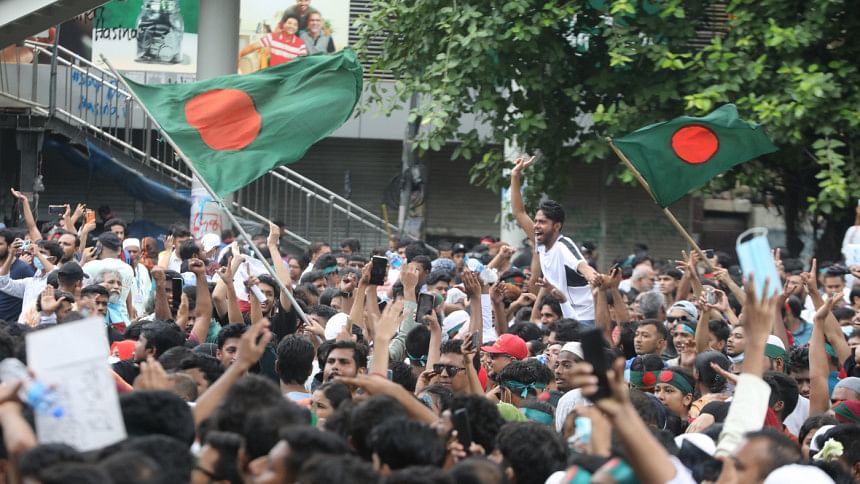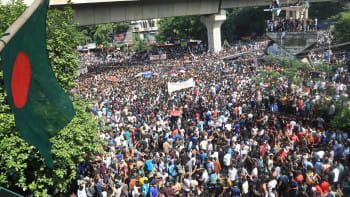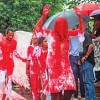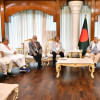Rebranding and rebuilding Bangladesh

"It was the best of times, it was the worst of times, it was the age of wisdom, it was the age of foolishness, it was the epoch of belief, it was the epoch of incredulity, it was the season of light, it was the season of darkness, it was the spring of hope, it was the winter of despair."
In many ways, August 5 marked a new beginning for Bangladesh, and nothing describes the events that followed better than the quote above by Charles Dickens. We have seen the remarkable struggle by the youth, who led the July revolution and ousted a dictator. We have seen a brief period when the country plunged into complete lawlessness as the police retreated themselves from the streets. We have seen attacks on minorities, we have seen inflated reports of these attacks too.
We have seen cities turn into Gothams––the crime-infested fictional city from the Batman comics—and we have seen literal Batmen rise up to the occasion, with citizens acting as vigilantes to protect one another. The youth, who led the revolution, took to the streets to manage traffic, even when they didn't have to. We have seen them repaint their cities in the colours of hope and resistance. We have seen them questioning the status quo. Through this revolution, we have seen an "apolitical" generation turn fiercely political.
Now that the dust is starting to settle down, there are growing calls for reforms across the nation. The youth are voicing their demands louder than ever and it is clear that they do not want to go back to the broken old system. The country's eroded democratic institutions must be restored. Reforms must come, and they must come in all sectors. But where and how do we begin?
It is commendable that the interim government has taken its first steps, starting with the administration, particularly the police force. For 15 long years, the police force has been slowly transformed into a repressive state apparatus, distancing itself from the people. The anger, fear and hatred of the mob directed at this force must be taken into account, and we are seeing reform beginning with changes to police uniforms and logos.
However, police reform must not stop with cosmetic changes. The force must be retrained, if needed, in modern, humane policing practices. The revamped Bangladesh police must treat everyone with dignity and respect, prioritise the community, promote transparency and rule of law and, above all, be a force that we can trust. While changing the logo and the uniform of the police is a good starting point, long-term reforms are essential if it is to become a trustworthy, people-first institution.

Changes must come in other sectors too. It is time to seriously address the country's public transportation system. The capital Dhaka is one of the slowest cities in the world. A 2024 study by the Dhaka Chamber of Commerce and Industry found that Tk 140 crore worth of working hours are lost every day due to traffic congestion. The outcry over this issue is hardly new and for years, the politically-backed transport-owners' syndicate has been blamed for this.
This syndicate must be dismantled and the public transport sector must be freed. Franchise-based bus routes should be introduced in our cities and the bus route permit system must be freed from police control and fixed in coordination with the city corporations. Additionally, the traffic police must also be trained in modern traffic regulation systems and ensure their proper implementation on the streets.
Rebranding is also necessary in the country's tourism sector and national services, including Biman Bangladesh. Biman's outdated branding warrants a modern rethink, but reforms should not stop with just rebranding. The national carrier must strive to become a leading airline in the region, representing the national brand with pride. In 1984, Emirates Airlines started its journey as part of Dubai's long-term vision of transforming the region into a global hub. Today, it is a leading brand ambassador of the UAE, attracting foreign remittances and investments into the empty deserts of Dubai—which interestingly freed itself in 1971 from the British—and turning the once quaint fishing village into a modern business hub.
The youth of Bangladesh want radical changes, not just on the surface but in the very way our society operates. We must rethink our political culture and gradually move away from the politics of muscle and street dominance to the politics of intellectualism and free thinking. Good governance, accountability and actionable promises need to be introduced in political practices, starting at the grassroots levels.
Long-term reforms in our educational system are also crucial, with a vision towards a larger goal. Our redesigned educational system must strive to produce socially inclusive, tolerant, civic, politically mature and technically skilled citizens. In the 1950s and 1960s, Lee Kuan Yew, the founder of modern Singapore, shifted his government's focus on building a universal education system that would provide a skilled workforce for Singapore's large-scale industrialisation programme.
To support this, Lee's government also saw the need to develop a professional, well-paid and resourceful teaching force, along with local universities of international standard that could compete globally. Today, modern Singapore enjoys the benefits of these visionary initiatives. And there is no reason why Bangladesh cannot follow the same path.
We hope reforms in other sectors will follow. And that the interim government, with an advisory panel that garners high expectations, will lay down the groundwork for these foundational reforms and work towards strengthening our social and political institutions so that the next democratically elected government can build on these frameworks and create a truly prosperous "Bangladesh 2.0."
Since our independence, no government in Bangladesh has been able to truly materialise the expectations and demands of its citizens. We dream of a new Bangladesh where every citizen, regardless of their religion, ethnicity and gender, can live with dignity and their basic human rights fulfilled. Will this government and the next ones be able to fulfil our demands? History teaches us to be sceptical. But the July revolution teaches us that nothing is impossible and that people are more powerful than their governments. So, we will patiently wait for the reforms. Until then, we will keep dreaming, no matter how hopelessly optimistic it may seem.
Zarif Faiaz is a journalist at the Tech & Startup section of The Daily Star.
Views expressed in this article are the author's own.
Follow The Daily Star Opinion on Facebook for the latest opinions, commentaries and analyses by experts and professionals. To contribute your article or letter to The Daily Star Opinion, see our guidelines for submission.

 For all latest news, follow The Daily Star's Google News channel.
For all latest news, follow The Daily Star's Google News channel. 










Comments